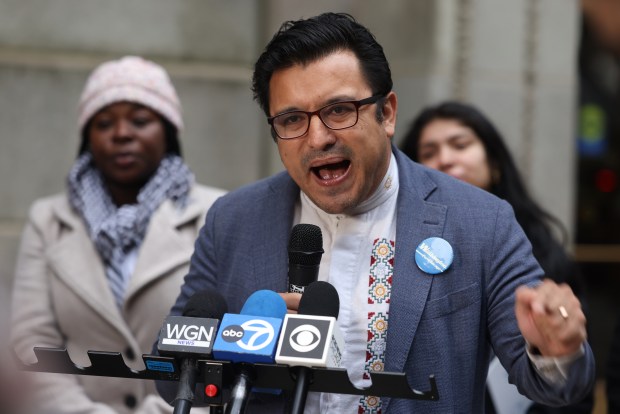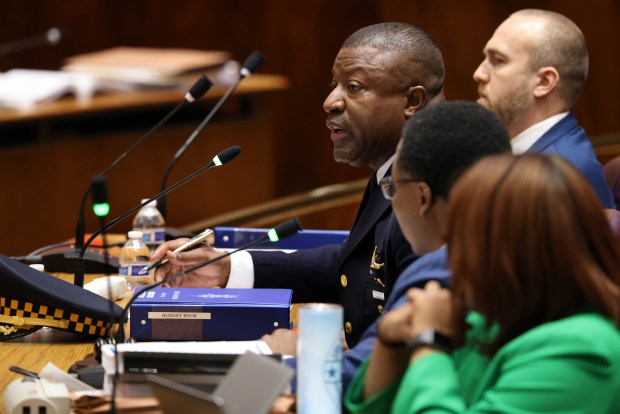City Hall’s turbulent budget negotiations turned to Chicago’s police force Friday, with aldermen split on pushing for cuts or additions to the high-dollar and high-stakes department.
A day after the City Council unanimously voted down Mayor Brandon Johnson’s proposed $300 million property tax hike, aldermen continued looking for ways to close the new gap and balance the city’s 2025 spending plan. But the Police Department doesn’t fit the bottom-line budget narrative that drives debate over most government offices.
Johnson’s proposal includes $2.1 billion for CPD, up $58.7 million from this year’s allocation. Thanks to raises for rank-and-file officers, however, the department would lose 456 vacant positions in his budget, including hard hits to jobs critical to compliance with the department’s ongoing federal consent decree.
Despite the cuts, CPD Superintendent Larry Snelling avoided asking aldermen for more money at a Friday budget hearing. Instead, Snelling touted the department’s work during the Democratic National Convention and success this year in lowering many violent crime rates, including an 8% drop in homicides, according to department data.
Earlier this week, Illinois Attorney General Kwame Raoul wrote Johnson to “strongly urge” the mayor to not slash consent decree positions or risk the city being held in contempt of court for failing to comply.
But the closest Snelling got to the department’s potentially reform-hampering cuts was asserting the consent decree’s importance to argue CPD is still “a department of transformation.”
“The consent decree is not just about reaching compliance with a document,” Snelling said. “It’s about culture change. It’s about a lifestyle, a way of life.”
Some aldermen called Friday for the city to reinstate consent decree positions in the 2025 budget. Others in City Council chamber pushed for broader new investments.
Several aldermen aired their support for an ordinance proposed Thursday to budget almost $7 million to resuscitate the ShotSpotter gunshot detection system that Johnson ended in September. Ald. Marty Quinn, 13th, re-upped his calls for a new police district to be added in his far Southwest Side ward using a building effectively donated to the city by state legislators.
When asked if the department might get more helicopters, Snelling signaled his support for the expensive idea as a way to save lives and even money by avoiding the car chases that often end in injuries and legal action against the city.
“This is a one time fee to pay for a helicopter to save us millions and millions in lawsuits,” he said.
Snelling also noted a previously unreported change to the budget. Nine vacant positions tasked with supporting the mental health of officers were cut in Johnson’s original plan, but when Police and Fire Committee chair Ald. Chris Taliaferro asked about the cuts, Snelling said he and the mayor had agreed to reinstate the “extremely important” positions.
“That’s taken off the table now,” he said. “We are back to where we need to be.”
Some aldermen looked for smaller efficiencies. Ald. Pat Dowell, 3rd, asked how the department might get more officers back from medical leave. There are 910 off with medical issues now, she said, all overseen by one doctor. Snelling said he is already looking into the leave system.
Others called for broader cuts to CPD.

Standing outside of City Hall Friday morning, Ald. Byron Sigcho-Lopz, 25th, demanded the department fire officers with ties to far-right organizations and called for an audit of Police Department finances to free up more money he said is needed to implement progressive policies.
“What we need is to have the morality to take stances on things that actually matter to working people,” Sigcho-Lopez said.
And he took a shot at the push colleagues made Thursday to reinstate ShotSpotter.
“Spend less time fighting for failed software, for companies, for corporations, for billionaires,” he said. “And take more time to fight for working people so that we can find the money.”





